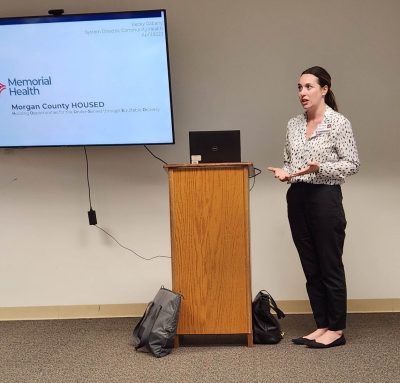Several stakeholders in the area’s concerns with homelessness gathered at the Jacksonville Public Library on Tuesday night.
The summit was hosted by Jacksonville Memorial Hospital in an effort to begin to form a comprehensive plan for Morgan County to combat perpetual homelessness in the community.
Memorial Health system director of community health Becky Gabany says the goal of the summit is to gain community input into the plan: “The best solutions are collaborative solutions, and we can’t think of everything even as a steering committee who is directly embedded in these direct services. We need other perspectives as well. We want to know what do community members generally understand about homelessness or want to know about this, are they interested in helping, etc. That’s where we think it’s really important to hold these summits in the community to engage everyone broadly.”
Gabany says that the goal is to get the local homeless population to “functional zero,” meaning that when a person is made homeless, they are out of that situation in 30 days or less, and never have to return. Currently, a steering committee made up of members of the city and county government, Jacksonville Police, and 12 other community organizations are meeting once a month in hopes of providing a final action plan by the end of September.
Memorial Health is using a similar action plan that was developed in Sangamon County over the last two years. The plan cost a little over $100,000 to come up with and put into place, which involved multiple community partners and a local and national consulting firm to make sure that the plan was functional and equitable.
Gabany says that funding will be pulled from the community partners and stakeholders into fashioning Sangamon County’s template into one that works for Morgan County’s more rural setting: “We’ve been really excited to see how we invested that in Sangamon County and all that the we’ve learned from that exercise. We’re now able to bring that to the other counties without charging them or any kind of financial commitment that our rural counties have to put in to going through a similar process. What we’ve found is that once we have a plan developed for a county, then, we are in a much better position to apply for other funding opportunities. There’s a lot of money flowing in through the federal government right now to address homelessness, but you have to have a plan for it, and you have to be following best practices, and you have to be working on a coordinated approach. We hope to do all of those things through this plan and that will really open up those funding opportunities.”
One of the hopes is to gain more of that federal funding from the West Central Illinois Continuum of Care, which Morgan County is a part of along with Adams, Brown, Cass, Hancock, Henderson, McDonough, Pike, Scott, Schuyler, and Warren counties. Currently, in Morgan County, the Jacksonville Salvation Army is paying $40,000 per month through grant funding to shelter those in homeless situations.
Gabany says some other surprising statistics is that 76% of those that are homeless in the county do have some form of income, with 40% of those having a steady job. Gabany says in statistics gathered from area school districts that there are 114 children that are considered either homeless or have little to no home security, with 61 of those directly in Jacksonville School District 117. Gabany says that homelessness is a hidden issue in the county, because rural settings typically have what are called the “hidden homeless.”
Hidden homeless people are those frequently live in temporary situations like squatting, couch surfing, or temporarily rooming with a stranger or family member. Members of the Jacksonville Police Department told the JMH homelessness program steering committee that the hidden homelessness situation puts a lot of strain on their resources due to the amount of problems it can create on multiple levels.
Gabany says that there’s a multi-pronged approach being taken to tackle the homelessness issue both here and in other rural Central Illinois counties: “Part of our goal is to say how many housing units we would need to help people to not be experiencing homelessness anymore and what kind of supports would be needed to help stabilize people in that housing. Then, once we’ve identified that number or that gap, we can start figuring out who are we asking to help us develop these units or where could we put those who might be interested in supporting that. To the point, this is multi-pronged and a complex issue that has complex solutions. In Springfield and Sangamon County, we were able to get kind of large buy-in from community foundations, United Way, county & city government, churches, all kinds of different groups, hospitals to help contribute financially to the solution and through manpower, raising awareness, strategizing with us, etc.”
Gabany says if anyone would like to get involved or provide input to the final action plan, they can contact her by calling 217-788-3374 or email communityhealth@mhsil.com or you can contact Director of Community Health at Jacksonville Memorial Hospital Lori Hartz.




